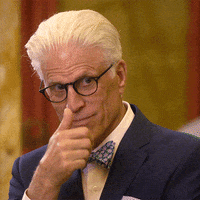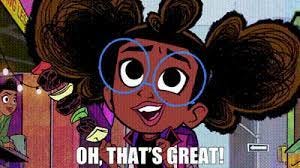Her Own Muse
I don’t know Lisa Muse Bryant, but I cannot wait to meet her this Sunday at our live Zoom Q&A. It’s at 11am PT/ 2pm ET. You ask the Q’s, Lisa provides the A’s. And the only way to attend (or to listen to the recording later) is to become a paid subscriber.
While I haven’t met Lisa, our mutual friends, especially those who have worked with her, hold her in such high regard. She’s worked on an impressive array of comedy shows, including A Man On the Inside, Primo, Moon Girl and Devil Dinosaur, Kenan, Black-ish, The Thundermans, and more.
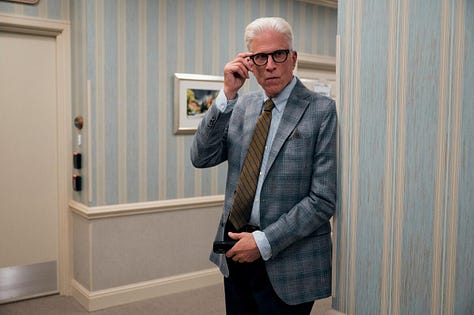
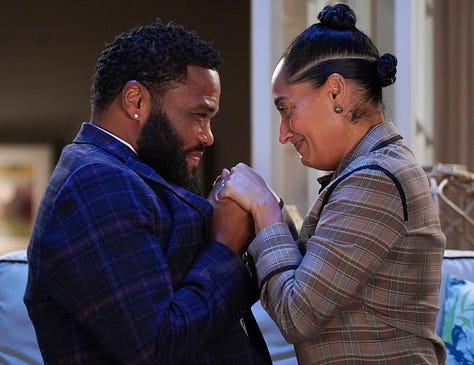
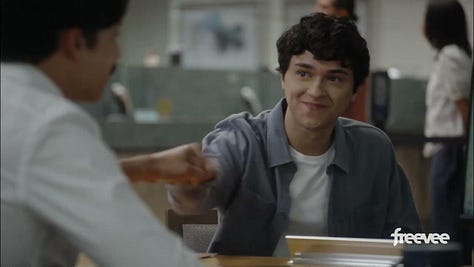
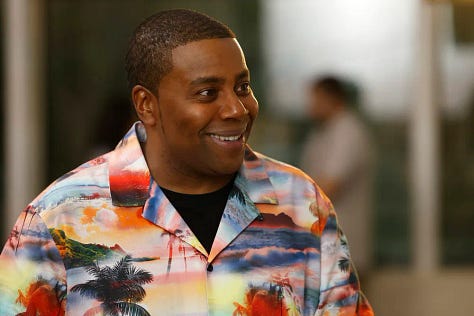
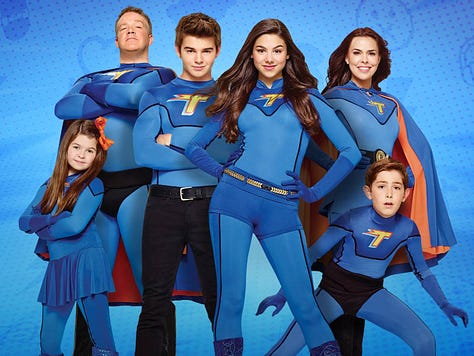
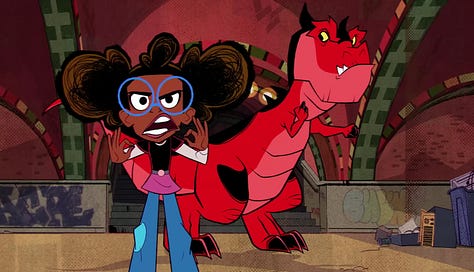
And while her resume is really impressive, what I keep coming back to is this terrific article she published on her Substack, My Own Muse, last year.
In “Write What’s In You,” Lisa describes how “your best work will come from within– within your own life and your own imagination.”
Your best writing comes from you being deeply connected to it. Passionate about it. Whether it’s the silliest, broadest comedy or the heaviest, tear-inducing drama. Because that connection, that human perspective will give you the ability to ground your characters in something true. To give them dimensions, contradictions, to make them feel something deeply or believe certain things about the world around THEM.
And guess what? The more specific and true and real you make those characters, the more they will resonate with audiences. People will connect to your specific character derived from your lived experience, grounded in real emotion, because you’re a human being. And our humanity, the emotional reactions we have to the world around us, is shared.
It’s an important lesson that I’m trying to keep in mind as I leap into new projects, from the planning stages through to the final polish. I’m trying to remember that these characters are me, that they contain aspects of myself, that they have to if I’m to keep their stories truthful and affecting.
6 Questions with Lisa Muse Bryant
1. What you working on right now?
I am currently on season two of A Man on the Inside for Netflix (The Ted Danson show about a retired widower who answers a want-ad to be a mole for a PI in an assisted living facility.)
I also sold a pilot to NBC, under my development deal at Universal TV, which I’ve been working under for the past three years. It’s a multi-camera family comedy. The premise is: A free-spirited Black mother and a responsible Korean father raise their precocious daughter in the family home of his uber-traditional Korean parents.
2. What challenges are you facing specific to your current writing project?
Well, development is always challenging because you have to find a balance between the show you want to make versus the show the network wants to make. Sometimes you’re on the same page, but they want small tonal or character changes. And sometimes, it feels as if the notes you’re receiving run counter to the show you want to make.
Whichever situation I’m in, I always listen to the notes and try to figure out how I can deliver the feeling they’re hoping to capture. I try to figure out if it’s a simple tweak or a rethinking of the characters, story themes, jokes, tone. The thing I usually find is that whenever I get a note, it usually forces me out of my comfort zone and to look at the story, tone, characters, and/or jokes in a different way that ultimately makes the script better.
As far as A Man on the Inside goes, it’s a pretty difficult show to write. We have to break a mystery/spy story while also serving Charles' emotional needs and growth. He’s a man of a certain age who is restarting his life after a huge loss and life transition. So it’s a spy show that’s not a spy show. As tricky as it is to write and maintain the proper tone, it’s a huge labor of love for everyone involved in bringing it to the screen.
3. What advice about the business of TV/film writing can you give to someone starting out now?
It’s such a tough time in the business right now, especially for people who are just starting out or trying to break in.
My advice if you’ve had one staff job or have been an assistant and are trying to get your first writing job, is to use every contact you have for informational interviews, job leads, etc. Get coffee with that upper-level writer you had a rapport with, call that story editor who you were talking with about movies or sports or whatever. Don’t be afraid to be persistent. People are just busy and may not get back to you right away.
If you’ve just moved to LA or have been here awhile and are trying to break in, I’d say try to find a job in the vicinity of production: as an assistant, PA, on a lot…
The job that led to my break was as a payroll accountant on the Dr. Phil show on the Paramount lot. If all else fails, I’d say get a job to pay the bills and just keep writing. When things open up, and they usually eventually do, you’ll have samples to show and be prepared when someone asks to read something.
At the end of the day, it comes down to meeting and being in touch with people who will eventually have the power to hire you and making sure you have writing samples that are undeniable. And if possible, get with your fellow creatives and make something. Hone your skills and keep working on your craft.
4. What advice about the craft of writing can you give to someone starting out?
There’s technical stuff that I swear by, like making story skeletons, beat sheets, and outlines. When beating out your story, never go with your first thought. Run through every possible scenario and consider multiple ways each beat could play out. Sometimes you’ll come back to your first thought (if it’s undeniable), but most times you’ll come up with something fresh and different. For me, the more detailed the outline, the better. By the time I get to the script, I know my story is pretty solid and I can focus on dialogue, jokes, and trying to incorporate things to zhuzh up the scenes.
For comedy writers, I’d say write characters that feel real and not cartoony. Even your silliest, most outlandish characters should be grounded in some kind of truth or have some vulnerability that people can relate to.
The main thing, though, is to look within yourself for inspiration and story ideas. I named my company My Own Muse because it’s my name but mostly because I’ve learned that the best stories come from some kernel of truth– whether it’s an incident you or someone in your world has experienced or an emotion you’ve felt. It doesn’t have to be an exact account or anything, but it should come from somewhere real and true so that your audience can come away feeling connected to humanity in some way. I know it sounds lofty, but it’s kinda simple. Whatever genre you’re writing, I’d say put at least a little of yourself into it. This is one of the main things I stress to new writers, mentees, etc. It’s the centerpiece of my Substack. One of the key scripts I sold came from a pitch about a family incident that I fictionalized and added a musical hook to.
5. What do you respond to most in a piece of writing?
There are so many different things I look for, depending on what my needs are. The big things are: Jokes and perspectives I haven’t seen a million times. Stories that are simple to follow but are also engaging. Characters that feel multidimensional and motivated to do the things they’re doing in the script. I like a spec or an original, as long as it feels fresh, even if the story is familiar. I feel like there are only like eight stories and a million different ways to tell them.
6. What are you watching/reading/listening to lately that’s getting you excited or inspired?
I love Julia Louis Drefyus’ podcast Wiser Than Me, where she interviews older women. It’s really wonderful and a great place to get awesome life and career advice.
Movies I’ve loved recently: Wicked, The Substance, Nickel Boys.
TV Shows: Squid Game Season 2, Bad Sisters, Resident Alien, Hacks, I absolutely LOVE We Are Lady Parts. There’s still so much I have to catch up on.
I also have a million half-finished audiobooks I’m listening to. I’m reading Caste by Isabel Wilkerson after being blown away by Ava Duvernay’s Origin. I also recently read G-Man: J. Edgar Hoover and the Making of the American Century. That was a fascinating read. I never thought I’d be riveted by a book about Hoover from birth to death, but I highly recommend it.
This should be a great Q&A full of insight and practical advice! Join us this Sunday, February 16, 11am PT. Info below. If you’re not already a paid subscriber…
Keep reading with a 7-day free trial
Subscribe to Re:Writing to keep reading this post and get 7 days of free access to the full post archives.

